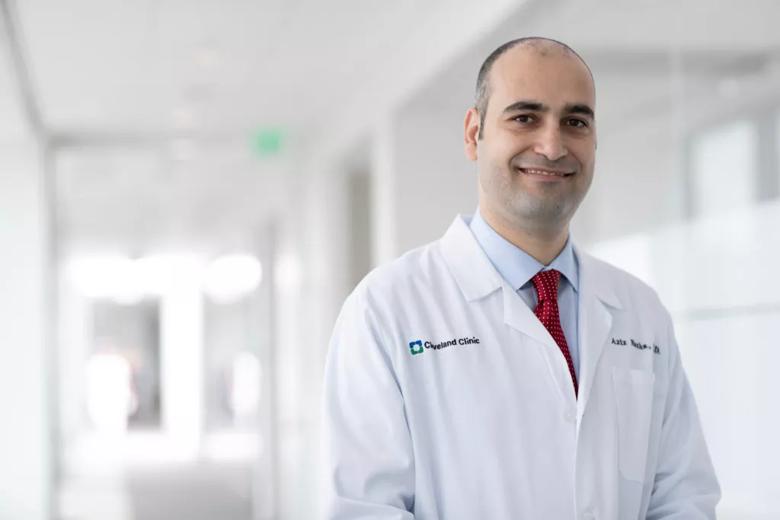Helping to shape a new field of medicine that will improve patient outcomes and reduce the cost of care.

Image content: This image is available to view online.
View image online (https://assets.clevelandclinic.org/transform/0d3ea81d-6d71-4455-b040-8c54f6cd2b99/nazha107-1024x683_jpg)
Aziz Nazha, MD (Photo by Russell Lee)
Advertisement
Cleveland Clinic is a non-profit academic medical center. Advertising on our site helps support our mission. We do not endorse non-Cleveland Clinic products or services. Policy
Aziz Nazha, MD, (H/O’16), and his team of medical students, residents and fellows at Cleveland Clinic’s Center for Clinical Artificial Intelligence are helping to shape a new field of medicine that will improve patient outcomes and reduce the cost of care.

Image content: This image is available to view online.
View image online (https://assets.clevelandclinic.org/transform/e24ef930-08b6-43cd-a4f0-14b00448761b/19-CNR-5099-AI-in-AML-650x450-predict-survival-outcomes_jpg)
Aziz Nazha, MD, Director of Cleveland Clinic’s Center for Clinical Artificial Intelligence, worked with a team to develop a computer model for prognostication for acute myeloid leukemia patients and is now developing other algorithms.
Some of our projects already are published, or in the process of being published,” says Dr. Nazha, Associate Medical Director for AI and associate staff, Hematology/Oncology, who leads the center.
“In some projects, we’ve tried to improve diagnosis of cancer, prognosis and clinical decision tools that will help us to understand and recommend treatment,” he says. “For MDS, a form of blood cancer, the diagnosis can be difficult. We built an international collaboration to develop a model for patient blood counts and sequencing genes, and we use machine learning to improve the accuracy of the diagnosis.”
Another model the team created can provide a personalized survival prediction specific to a given MDS patient. “This got a lot of attention and was highlighted by 35 media outlets as one of the most innovative models,” he says. “When that is published, we hope that it will become the default model used to stage MDS. We also have built models for cancer to predict the risk of readmission to the hospital within 30 days, and we have some pediatric projects and an asthma project in which we use machine learning to predict the risk of asthma exacerbation.”
Advertisement
Yet, he emphasizes, these still are “early days” for the new center, established in March 2019, and its exploration of machine learning and AI technologies. “We see a lot of model developments, but not much implementation or reproducibility yet,” he says. “We are excited about what we can do and need to figure out how to make it work.”
The center connects Cleveland Clinic physicians and scientists in pathology, imaging, information technology, oncology, genomics, quantitative health sciences and other disciplines. “The whole purpose is to build a platform where we can get people together, share ideas and develop models to improve patient outcomes and decrease cost,” he says. “We are building projects for important research that will benefit patients.”
Building the new generation of physician-data-scientists is a priority for the center, he says. “We program everything in-house and build those projects from scratch. All of our work comes from great medical students, residents and fellows we train who are doing the work voluntarily because they want to learn. Also, education at the center is very important. We put out an optional medical school course to teach students how to program and how to develop machine learning and deep learning models.”
His students have had papers published and presented on their research at national meetings. One received a grant and multiple achievement awards, and also had several papers published in high-impact journals.
Building collaboration within Cleveland Clinic is among Dr. Nazha’s primary goals. “We want to inspire the world to work with us and become a bigger center that everyone sees as the hub for the birth of new technologies and models that use AI to build the future of healthcare.”
Advertisement
Advertisement
Honoring Exceptional Achievement, Service and Leadership
We celebrate the exceptional achievements of four future alumni
Honoring Exceptional Achievement and Leadership
Meet Hardeep Phull, MD (CCLCM’11)
Meet William Tierney, MD, MS (CCLCM’16, OTO’18)